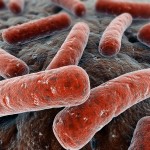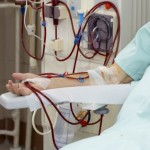I've seen several articles in The New York Times and the Wall Street Journal in the past few days about diseases caused by an extremely toxic new strain of the common bowel bacteria, E. coli. More then 1,800 people in Europe have been infected with this food-bourne illness and some have died from an unusual kidney complication it can lead to.
The "bug" itself appears to be highly resistant to antibiotics and experts in the United States feel the wrong approach is being taken in Europe. One professor from Washington University is quoted as saying, "If you give antibiotics and the strain is (already) resistant, then you give that bacteria a competitive advantage..."
Here the recommended strategy is not to treat E coli infections with antibiotics at all. American doctors give IV fluids to help keep the kidneys functioning. They dialyze patients who develop acute kidney failure. On both side of the Atlantic physicians agree that people who develop bloody stools should be admitted to a hospital in an isolation room/ward. Otherwise a person who has an E. coli-caused diarrheal illness can easily infect others.
The rare, but deadly kidney disease that these food-bourne bacteria can cause is called hemolytic-uremic syndrome (HUS). The NIH PubMed website defines it as a disorder that usually occurs when an infection in the digestive system produces toxic substances that destroy red blood cells, causing kidney injury.
Hemolytic-uremic syndrome (HUS) often occurs after a severe gastrointestinal infection with E. coli bacteria (Escherichia coli O157:H7). However, the condition has also been linked to other gastrointestinal infections, including shigella and salmonella, as well as infections outside the GI system.
In America HUS is most often seen in children and is the commonest cause of acute kidney failure in them. Several large outbreaks in 1992 and 1993 were linked to undercooked hamburger meat contaminated with E. coli.
But in this case we're not talking about meat, but rather vegetables. In the past American outbreaks have been associated with contaminated tomatoes, lettuce and cucumbers.
So should we be worried? Thus far there have been only four cases identified in the US. Those people had traveled to the northern part of Germany recently and that's been identified as the epicenter of this E. coli outbreak. Germany has had 1,733 cases in the most recent count I could find. Initially Spanish cucumbers were blamed, but now it appears clear that Germany is the source.
The FDA is closely monitoring lettuce, cucumbers and tomatoes imported from Germany and Spain, but those countries account for <0.2% of our imported produce.
My family is about to start our 26-week season eating locally produced organic vegetables from Grant Family Farms, the CSA we joined last year. That improves my comfort zone enormously. I think the rest of you should consider farmers' markets, CSAs and other sources for vegetables that are grown relatively near your homes.
I've been saying that for a while; this outbreak just reinforces my thoughts on the subject.


